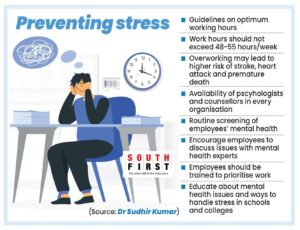Published Sep 25, 2024 | 7:00 AM ⚊ Updated Sep 25, 2024 | 11:07 AM

Anna Sebastian Perayil, who died on 20 July, is reportedly a victim of a toxic work culture/
The death of 26-year-old Anna Sebastian Perayil, a chartered accountant employed at Ernst & Young, has sparked nationwide outrage and drawn attention to toxic work environments in many corporate offices.
Instead of addressing this issue, Union Finance Minister Nirmala Sitharaman advocates for “stress management lessons” and “putting faith in God” as solutions, which have enraged corporate employees and mental health experts. The minister’s response not only deflected responsibility from employers but also blamed victims for their inability to handle pressure.
“Instead of advocating a strict policy on working hours, stress addressing mechanisms and laying out proper guidelines to employers to ensure a stress-free workplace, here is a minister giving lectures on providing ‘stress management lessons’. Does she even know what stress at the workplace does to one’s body and mind?” Shrikrishna N, a private company employee in Bengaluru, asked.
While colleges and schools need to promote stress management lessons, Community Psychiatrist Dr Nilesh Vasant Mohite emphasised that it alone would not address stress at the workplace.
“We need to examine workplace policies. Many corporate and government offices have poor work environments. It’s crucial to consider work quality, the behaviour of senior staff, and how they communicate with employees—all these factors significantly impact stress levels,” he explained.
“Policies must be upheld, and if senior staff maintain appropriate behavior, workplace stress can be reduced. Instead of focusing solely on stress management lessons in educational institutions, we need to address the root causes of stress in workplaces,” he added.
Addressing students at a private college, Sitharaman reportedly suggested that colleges and families should instill inner strength in students to cope with stress, which can be achieved through spiritual practices.
She emphasised the need for “atma shakti” to handle work pressure while emphasising the importance of seeking divine blessings.
“A woman who had studied CA well… unable to cope with the work pressure, two-three days ago we received a news… she died unable to cope up with the pressure,” she said.
Sitharaman’s comment sparked an outcry, with several Opposition leaders and corporate employees criticising her for trivialising the matter.
Shiv Sena (UBT) leader and Rajya Sabha MP Priyanka Chaturvedi asked the minister to stop victim shaming. “Dear Nirmala Sitaraman ji, Anna had the inner strength to handle the stress that came with pursuing a gruelling Chartered Accountancy degree. It was the toxic work culture and long work hours that took away her life which needs to be addressed. Stop victim shaming and at least try to be a little sensitive. Am sure god will be the guide if you seek,” she said on X.
Dear Nirmala Sitaraman ji,
Anna had the inner strength to handle the stress that came with pursuing a gruelling Chartered Accountancy degree. It was the toxic work culture and long work hours that took away her life which needs to be addressed. Stop victim shaming and at least try to be… pic.twitter.com/HP9vMrX3qR
— Priyanka Chaturvedi🇮🇳 (@priyankac19) September 23, 2024
However, the minister on Monday, 23 September, responded to Chaturvedi.
“Had referred to this matter in a talk delivered in Tamil at a deemed University on the outskirts of Chennai. Had specifically mentioned that after clearing a demanding and rigorous examination such as CA, the stress on her was unbearable. No names were taken, neither of the lady nor of the firm,” she said on X.
“The University has set up a Meditation Hall and a place of worship for all its students and faculty. It is in this context that I spoke on how it is necessary to build inner strength for students,” she further stated.
“With a sense of grief over the tragic loss, I highlighted the importance of institutions and families to support the children, and in no way victim shaming was done nor intended, even remotely,” Sitharaman explained.
“The Union Labour Ministry has already assured a thorough investigation into the allegations of an exploitative work environment related to the tragic demise,” she added.
Dear @priyankac19,
Had referred to this matter in a talk delivered in Tamil at a deemed University on the outskirts of Chennai.
Had specifically mentioned that after clearing a demanding and rigorous examination such as CA, the stress on her was unbearable. No names were taken,…
— Nirmala Sitharaman (@nsitharaman) September 23, 2024
The minister’s remarks did not have many takers. Several psychiatrists and medical doctors agreed that “stress at the workplace” was real and could lead to several health complications, including mental health issues.
“Anna had the inner strength to handle the stress that came with pursuing a gruelling Chartered Accountancy degree. It was the toxic work culture and long work hours that took away her life which needs to be addressed. Stop victim shaming and at least try to be a little sensitive, am sure god will be the guide if you seek,” an X user told the finance minister.
Speaking to South First, Dr NR Mutalik, Professor and the Head of the Department of Psychiatry at S Nijalingappa Medical College in Bagalkot said one cannot leave things to God. “He will help only those who help themselves. Leaving to God is similar to dying by suicide when a person is suffering from depression,” he said.
In her speech, Sitharaman suggested that educational institutions should teach students to handle stress by developing “inner strength” through spirituality and discipline. She implied that the inability to cope with work pressure was a personal failure rather than a structural issue.
Several private company employees have anonymously shared their experiences, describing a culture of excessive work hours and high expectations with little support.
“It’s not just the workload but the constant pressure to perform and prove yourself. I’ve seen colleagues break down, but there’s no system in place to support us,” Prashanth Ram (name changed), a private company employee, said.
“The Finance Minister’s comments make me feel like our struggles are being dismissed. We need policies to ensure work-life balance, not lectures on spirituality,” another employee chipped in.
Mental health experts argued that while stress management could be a helpful tool, it was not a solution to the systemic issues of toxic workplace cultures, long working hours, and unrealistic expectations.
Speaking to South First, Dr Sudhir Kumar, Neurologist at Apollo Hospitals in Hyderabad said stress at the workplace has unfortunately become common.
“I see many people aged 20 to 50 in my outpatient department, with various complaints such as headache, sleep disturbance, neck pain, back pain, dizziness, and psychological symptoms. While interacting with them, more than 90 percent of them accept being stressed at the workplace,” he pointed at a growing problem.
Dr Ravindra S, a Bengaluru-based mental health expert, said blaming individuals was easy. “Blaming individuals for their inability to manage stress is an easy way out. What is needed is a thorough reform in work policies, better mental health support, and accountability from companies,” he opined.
Several others, too, felt that suggesting to manage stress by “believing in God” or through “atma shakti” was not only insensitive but also alienated those who might not subscribe to such beliefs. It would shift the focus away from corporate accountability to individual resilience, which was not a sustainable solution.
Dr Ashwini NV, mental health professional, and CEO of Flourish Lifeschool, said individuals typically find inner strength from a variety of sources. “For example, someone’s inner strength could stem from their self-confidence, courage, sense of purpose, spiritual practices, or some other life skill. It must be noted that each one’s inner strength will come from different sources, and not always from spiritual practice,” she told South First.
She added that teaching spiritual practices in educational institutions could be sensitive due to the diversity of beliefs among students based on their backgrounds.
Dr Ashwini termed spirituality a personal journey. Though exploring it could be beneficial, it should not be mandated or presented as a one-size-fits-all solution.
“Educational institutions should aim to train students on stress management techniques like mindfulness, cognitive-behavioral strategies, and breathing exercises that are not liked with any system of faith. But this alone is not enough to ensure a stress-free workplace,” she added.
Experts emphasised that people should consult doctors to address stress. They underscored the need for policies to address various causes of stress in the workplace.

Beginning with work-life balance, how can one work on preventing stress?
Dr Mutalik said issues such as heavy workload, assigning tasks to already over-burdened employees, ineffective or non-existent communication, job insecurity, unsafe environments, a lack of policies, unequal payment, and promotions should be addressed.
While knowing one’s strengths and weaknesses is absolutely important stresses Dr Mahesh Gowda, psychiatrist and founder of Spandana Hospitals, said employees must ensure sound relationships with colleagues and people should know that handling everything alone is often impossible and hence should seek professional help.
“There are many helplines to seek professional help. Maintaining a diary or a daily journal also becomes extremely important,” he told South First.
Meanwhile, Dr Ashwini added that the responsibility of training individuals on stress management should be a collaborative effort involving families, educational institutions, workplaces, and individuals themselves.
“Ideally stress management must be seen as a life skill. Students must be supported in developing skills to manage difficult emotions, starting from schools itself, and must continue at colleges and workplaces,” she opined.
She recommended employers take responsibility for eliminating organisational barriers to employee wellbeing. They must provide mental health support and develop tailor-made solutions to address the holistic well-being of employees. Individuals must also put in efforts to develop healthy coping mechanisms and prioritise their well-being. “A joint effort is needed in ensuring employees’ wellbeing is safeguarded,” she said.
However, Fagun Jain, team lead at a corporate firm said many companies have expressed willingness to support in times of mental health crisis and encouraged employees to reach out to the bosses or human resources personnel, there have been multiple instances when employees refrain from seeking leave from work due to increased stress or fear of harassment by the managers.
“Such employees are termed as ‘complaint box’ ‘anxious person’ ‘sensitive’, etc., and are labelled as someone with mental health issues,” Jain said.
Several employees insisted that there was an urgent need to bring in a policy on working hours and keep the workplace safe. These should be written in black and white and the companies, whether government or private, must be made accountable under the law, argued Trupti Murthy (name changed), an employee with Deloitte.
(Edited by Majnu Babu).

